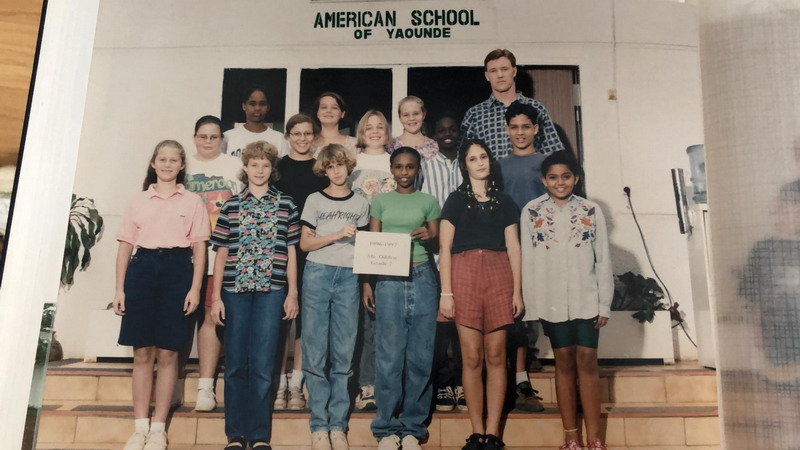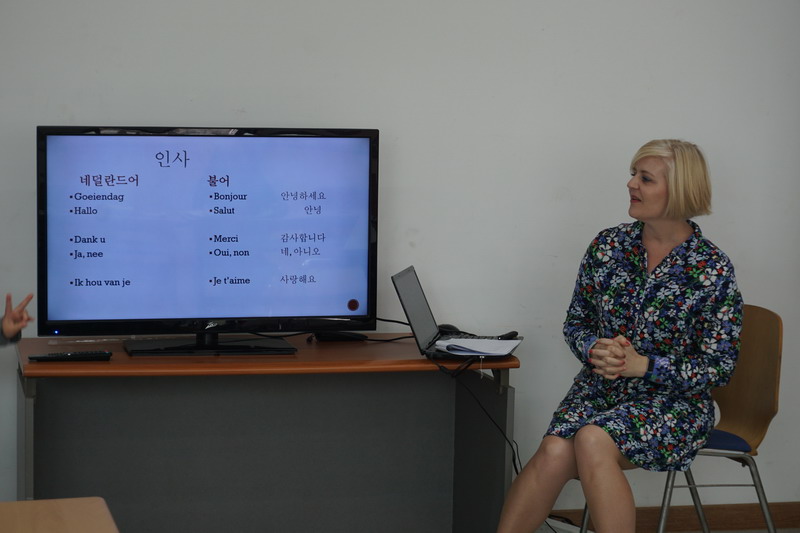Of Many Tongues: Speaker, Learner, Teacher
An Interview with Aline Verduyn
It is not very often that we run into a person who is a speaker of many languages. It is even rarer to meet a polyglot who has had formal instruction in not only learning languages but also in teaching. Our interview here is with one such person living amongst us here in Gwangju: Aline Verduyn. She has much to offer on speaking, learning, and teaching multiple languages. — Ed.
Interviewer: Thank you, Aline, for consenting to do this interview for the Gwangju News, especially since I know how busy your schedule is. To begin with, could you tell us a little about yourself in your pre-Korea life?
Aline: My pleasure! I always like to make time for the Gwangju community! Born in Belgium, I took my first flight at 10 weeks! I had attended 18 schools in six countries (Nigeria, Egypt, Cameroon, Sri Lanka, Vietnam, and Belgium) by the time I graduated high school. We speak Dutch at home, but I attended international schools (taught in English), hence my native-like level of English. I have been an expat most of my life, a third-culture kid. Growing up, my family moved for my father’s job; now, I get to choose the countries I live in. My first choice will always be Korea.
Interviewer: Having lived in so many other countries around the world. What was it that attracted you to Korea?
Aline: A question so often asked! And yet, it is so hard to put my finger on it. I have had Korean friends in almost every school I attended. It was only in 2001 that I had the chance to land at Incheon Airport myself. My father had started working in Busan, which gave me the chance to discover Korea in all its glory. For me, Korea was not a strange, far-away country; rather, it felt like coming home.
So, what did attract me? The snazziness of the technology, the cacophony of lit-up signs on every floor of every building, the bright green and red colors of the temples, the hanok houses, the cherry blossoms, the convenience of life in general (including 300-won coffee vending machines, clean subways, and free public restrooms), and then there is just… the universe pulling me towards Korea. So in a nutshell, and this answer I give to most Koreans, “I think I was Korean in a previous life.”

Interviewer: I have heard that you are quite a polyglot. What languages do you speak, and how did you come to know them?
Aline: Dutch is my mother tongue, which I only speak with my family. Since we lived abroad, school, friends, and the environment required me to speak English. Then there is French, another official language of Belgium, and a language I love. Besides learning it at school, we always had at least one French friend in every country to keep up our conversation skills. Living in Cameroon (a French-speaking country) as a teenager for two years also helped. In every country we lived in, we would pick up the basics of the local language. In Egypt, I learned to sing the national anthem in Arabic, and in Sri Lanka, I could sing it in Sinhala. In Vietnam, we learned the names of the fruits by going to the market, etc. We always knew our stay in each country was limited, so we could never fully learn a language, much to our regret. In high school, I studied German, which is not difficult for Dutch speakers. Spanish was my personal self-study project.

When coming to Korea, I really challenged myself in learning a language that was in no way even remotely similar to any of the languages I had learned until then. But the previous languages helped. Some grammar reminded me of French, the sounds are almost all the same as Dutch, etc. When working in Dubai, I challenged myself yet again to study Arabic academically. So, that has given me “awareness” of seven languages. Three years ago, I returned to Korea in order to master Korean once and for all.
Interviewer: So many languages you have learned, and from a young age! That brings me to my next question. When English was first being introduced at the elementary school level (Grade 3) in Korea in the late 1990s, there was a large group of parents and academics who opposed this, as they contended that learning a second language so early would interfere with their learning of Korean. You have learned second languages from a young age, so do you think this contention has any merit?
Aline: I have noticed it to be unique to Koreans to fear the intrusion of a new language. This concept was foreign to me before coming here. Used to a multilingual environment, languages were always considered a plus, and the more the better. I once read that we create language-learning brain space until we are five years old, so the more languages you are exposed to by then, the better. Although there could be a delay in speech acquisition due to bilingualism, it is by no means a concern. It all straightens out before you reach adulthood, so if it is a consolation for Koreans, please do not worry! The earlier you start, the better.
Interviewer: That has always been my position as well. Next question: Korean is the only second language that I can say I “know,” and I am still struggling with it. Do you think you were born with a talent for learning languages? Or are you just super motivated and super devoted to putting in the time required? Or is it more about being in the language-speaking community of the language you were learning?
Aline: When people are surprised to hear my list of languages, I just say, “Yes, I talk a lot!” I do believe some have more affinity towards languages than others. Some languages are acquired without choice, but for the ones we choose to learn, motivation goes a long way. As for me, I was surrounded by multiple languages all the time, and I enjoyed it. Impersonating accents, learning foreign words from friends, even watching TV I could not understand! I think this has prepared me for the Busan saturi (dialect), which I could somewhat imitate. I have yet to master the Gwangju dialect, though!

Interviewer: 할 수 있겠지라우. With so many languages in your speaking arsenal, do you ever get mixed up when speaking one foreign language and unintentionally add a word or phrase from a different foreign language?
Aline: I do not get confused when juggling different languages, as my brain matches languages with faces. I could be speaking three different languages to three different people in the room, as long as I face the right person. Having said that, I do bring in some words from another language, and it does get tricky when not everyone is on board.
Some cultural words and expressions are only possible in the local language, and so I do use the occasional word in a different language. For example, in Dubai all expats say Insh’allah instead of “fingers crossed,” and here in Korea, we all talk about ajumma and ajeossi to give an exact description of a character!
Interviewer: In a situation where you and the person you are speaking with each speak two languages quite fluently, do you find that the two of you often mix those two languages in your conversation? Or do you ever find that you will use one of those two languages, and the person you are speaking with will use the other?
Aline: Coming from Belgium, which is already a bilingual country to begin with, we are indeed used to hearing a certain language and responding in a different one. My hometown is close to Brussels, (officially bilingual) so both languages are used. To our neighbors on the left we spoke Dutch, and to the neighbors across the street we spoke French. At the store, the cashier will greet you in two languages, and you respond in the language you want to be addressed in. The cashier will then continue in your desired language. When conversing with friends, we speak one same language and stick to it. However, the occasional cultural expression could be taken from another language. I speak English to my scholarship friends here, however, since we all studied Korean, we often use Korean expressions that cannot be translated, like sugohaesseoyo or michigetta.

Interviewer: Over the years, I think you have been in many different language learning classrooms in many countries, both as a student and as a teacher. How does the Korean student compare or differ from others you are familiar with?
Aline: Korean students, in my experience, are the most well-behaved and eager to learn! It is thanks to working at hagwons in Korea that I have nurtured my love for teaching English. I commend their parents who understand the importance of learning English. Interestingly, I have experienced very chatty and spontaneous students under the age of 11. I am not sure what happens then, but suddenly my students become quiet, shy, and self-conscious of their English-speaking ability. Could it be that all the memorization of grammar rules, which starts at that age, takes away from their speaking confidence?
Interviewer: It could in part be due to the type of instruction they receive at that age; it could also in part be due to their cognitive development. I would like to ask you what your opinion is on establishing an English-only classroom as opposed to allowing Korean, or even using Korean in teaching, in the EFL classroom in Korea.
Aline: Being able to speak Korean always gave me an advantage when teaching English to Korean students, especially the younger learners and beginners. For one, I could verify if they understood me, and also, it let me build rapport with the students. Without speaking Korean, time is lost explaining things in English, or misunderstandings could occur. On the other hand, for adults, it is indeed possible to conduct a class completely in English. That is how I was taught Korean.
Interviewer: You have recently become involved in cohosting a bilingual English–Korean program on GFN Radio. How is that working out? Is the program useful for listeners in learning either English or Korean?
Aline: Absolutely. Listening skills contribute to speaking proficiency. Koreans often feel shy about their English level, so I encourage them to start with listening. Our program, Way Back With U, discusses current news, which exposes listeners to another set of vocabulary than what they are used to from their schoolbooks. We do not repeat every fact in both languages, but listeners get the gist of every story in either language. Even I am gaining Korean vocabulary every day!
Interviewer: Me too – both Korean and English! Well thanks, Aline, for giving so much time to this interview. I wish you the best with your radio program and also with the languages next on your language learning list!
Photographs courtesy of Aline Verduyn.
The Interviewee
Aline Verduyn just passed the two-year mark in Gwangju. She is determined to finish her master’s thesis this year while cohosting the evening show at GFN, Way Back With U. Instagram @gwangjumiin
The Interviewer
David Shaffer has been involved in EFL and TEFL in Gwangju for many years. As Gwangju-Jeonnam KOTESOL vice president, he invites you to become involved in the chapter’s activities. He is also the editor-in-chief of the Gwangju News.






